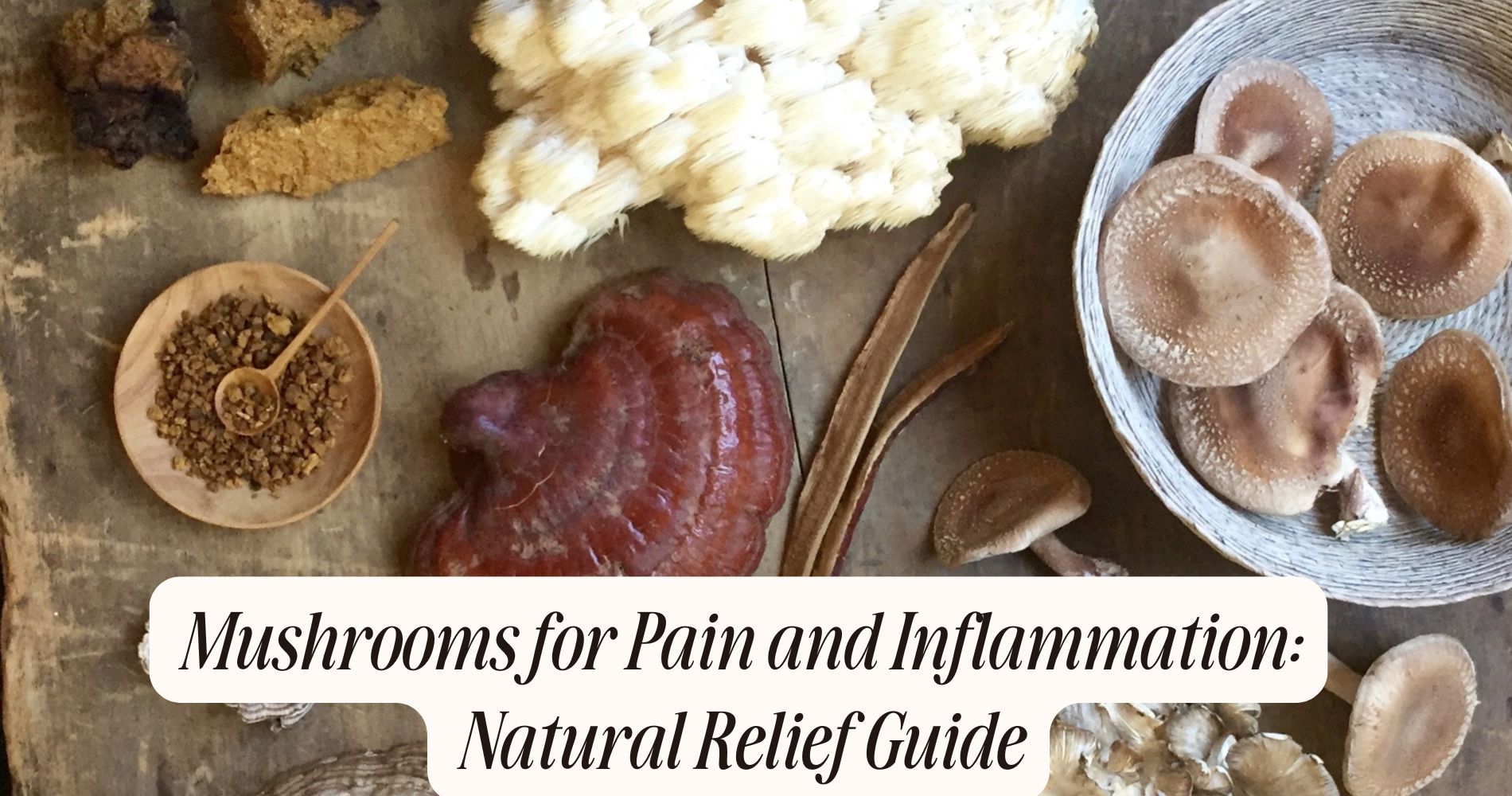
Mushrooms for Pain and Inflammation: Natural Relief Guide
Mushrooms like Reishi, Chaga, and Shiitake can offer you effective natural relief from pain and inflammation. Reishi mushrooms are especially renowned for their anti-inflammatory properties, helping manage chronic pain effectively. Chaga mushrooms boost your immune system and combat inflammation due to their wealth of antioxidants. Shiitake mushrooms also support inflammation management, packed with beneficial compounds. You can easily incorporate these mushrooms into your meals by sautéing them or adding them to smoothies. If you're curious about how to safely use these mushrooms or their dietary benefits, there's more information waiting for you.
Overview of Medicinal Mushrooms
Medicinal mushrooms have gained attention for their potential benefits in pain relief and inflammation management. You might be surprised to learn that these fungi have been used for centuries in traditional medicine across various cultures. Their historical uses range from boosting immunity to alleviating chronic pain.
These mushrooms contain unique compounds that offer impressive medicinal properties. For instance, polysaccharides, triterpenoids, and beta-glucans are known to support the immune system and reduce inflammation. By incorporating medicinal mushrooms into your routine, you may find a natural way to manage pain and improve your overall health.

Popular varieties like reishi, lion's mane, and chaga are particularly renowned for their therapeutic effects. Reishi, often called the "mushroom of immortality," is believed to promote relaxation and reduce stress.
Lion's mane, on the other hand, is celebrated for its neuroprotective qualities, which can help with cognitive function.
Understanding these mushrooms' historical uses and medicinal properties can guide you in selecting the right ones for your needs. As you explore their potential, you may discover new ways to incorporate them into your wellness journey.
Shiitake Mushrooms and Inflammation
Shiitake mushrooms are more than just a culinary delight; they also play a significant role in managing inflammation. Packed with bioactive compounds, shiitake mushrooms offer impressive shiitake benefits that can help reduce inflammation in your body.
One of the key components is lentinan, a substance known for its ability to enhance immune function and combat inflammatory responses. Incorporating shiitake mushrooms into your diet can be a delicious way to harness these benefits.
You can easily add shiitake mushrooms to various dishes. Try sautéing them with garlic and spinach for a quick side dish or toss them into a hearty stir-fry.
If you're feeling adventurous, you can include them in soups or even use them as a flavorful topping on pizza. There are countless shiitake recipes available, making it simple to experiment with these versatile fungi in your meals.
Reishi Mushrooms for Pain Relief
Relief from pain can often feel elusive, but reishi mushrooms may offer a natural solution. Known for their wide range of health benefits, reishi mushrooms can help address pain and inflammation effectively. These fungi contain powerful compounds, such as triterpenes, that have anti-inflammatory properties, making them a valuable addition to your wellness routine.
To experience the reishi benefits, you can consume these mushrooms in various forms, including capsules, powders, or teas. When it comes to reishi dosage, starting with 1 to 2 grams daily is a good guideline. You can gradually increase the dosage based on your body's response, but it's always best to consult with a healthcare professional before making any changes.

Integrating reishi mushrooms into your diet might help alleviate chronic pain and promote overall well-being. Whether you're dealing with arthritis or general aches, these mushrooms could provide a gentle yet effective way to manage discomfort.
Chaga Mushrooms and Immune Support
When it comes to boosting your immune system, Chaga mushrooms stand out for their remarkable benefits.
Packed with antioxidants, they help combat oxidative stress and support your body's natural defenses.
Traditionally, people have relied on Chaga for its healing properties, making it a powerful ally in maintaining overall health.
Immune System Boosting Benefits
Chaga mushrooms, packed with a wealth of antioxidants and polysaccharides, are gaining attention for their remarkable immune-boosting properties.
These unique fungi support your immune system through a process known as immune modulation, helping your body respond effectively to threats. When you incorporate Chaga into your routine, you're not just adding a nutritious element; you're enhancing your body's ability to ward off infections and maintain balance.
Mushroom extracts, particularly from Chaga, are rich in beta-glucans and other compounds that stimulate the production of immune cells, promoting a robust defense mechanism.
By promoting the activity of macrophages and other immune cells, Chaga helps your body fight off pathogens more efficiently.
Incorporating Chaga into your diet can be as simple as enjoying a tea or supplement.
As you explore its benefits, you'll find that this powerful mushroom not only supports your immune health but also contributes to your overall well-being.
Embracing the immune-boosting benefits of Chaga mushrooms can provide you with the natural relief you seek while strengthening your body's defenses against illness.
Make Chaga a part of your wellness journey today!
Antioxidant Properties Explained
In addition to its immune-boosting benefits, Chaga mushrooms are renowned for their powerful antioxidant properties. These mushrooms contain a variety of compounds that help combat oxidative stress, a condition where free radicals overwhelm your body's defenses.
By incorporating Chaga into your diet, you can support your body's antioxidant mechanisms, which work tirelessly to neutralize these harmful free radicals.
Oxidative stress is linked to numerous health issues, including chronic inflammation and pain. When you consume Chaga, you're not just enjoying a unique flavor; you're fortifying your body against the damaging effects of these free radicals.
The antioxidants found in Chaga, such as melanin and polysaccharides, play an essential role in reducing inflammation and promoting overall health.
Traditional Uses in Healing
For centuries, cultures around the world have relied on Chaga mushrooms for their healing properties, particularly in boosting immune function. You might find it fascinating that these mushrooms have deep roots in historical practices, especially in traditional medicine among Siberian tribes. They believed Chaga could enhance energy and ward off diseases, showcasing its cultural significance.

Incorporating Chaga into your wellness routine could be a nod to these ancient traditions. People often brewed it into teas or tinctures, taking advantage of its rich array of antioxidants and beta-glucans. These components are known to support immune health, making Chaga a valuable ally during cold and flu seasons.
You'll discover that modern research aligns with these historical uses, emphasizing the mushroom's potential to stimulate immune responses. As you explore natural remedies, consider how Chaga's legacy continues to inspire contemporary approaches to health.
Turkey Tail Mushrooms and Gut Health
Turkey tail mushrooms, known scientifically as Trametes versicolor, play a significant role in promoting gut health. These vibrant fungi are packed with polysaccharides, particularly polysaccharide K (PSK), which have been shown to support the gut microbiome. By enhancing the diversity and balance of gut bacteria, turkey tail helps create a thriving environment for beneficial microbes.
When you include turkey tail in your diet, you may notice improvements in digestion and overall gut function. The mushroom acts as a prebiotic, feeding the good bacteria in your gut and helping them flourish. This can lead to better nutrient absorption and a strengthened immune system, as a healthy gut microbiome plays a vital role in your body's defense mechanisms.
Moreover, research suggests that turkey tail mushrooms can help reduce inflammation in the gut, which is essential for preventing various digestive disorders.
Incorporating Mushrooms Into Your Diet
Adding mushrooms to your diet can be a delicious and nutritious way to boost your health. They're versatile and can easily fit into many meals. Start by experimenting with various mushroom recipes to find what you enjoy most. Sautéed mushrooms make a great addition to salads or pasta dishes, while stuffed mushrooms can serve as a delightful appetizer.
Consider incorporating mushrooms into your breakfast, too. Try adding chopped mushrooms to your omelets or breakfast burritos for an earthy flavor. You can even blend them into smoothies for an unexpected nutrient kick.

When it comes to dietary integration, explore different types of mushrooms. Shiitake, portobello, and cremini all offer unique tastes and textures.
Don't forget about mushroom-based sauces and broths. They can enhance the flavor of soups, gravies, and sauces while providing health benefits. You might also experiment with dried mushrooms, which can be rehydrated and used in various dishes.
Safety and Considerations
When considering mushrooms for pain and inflammation, it's essential to be aware of potential allergic reactions and how they might interact with any medications you're taking.
You should also pay attention to proper dosage guidelines to guarantee safety. Taking these precautions can help you enjoy the benefits of mushrooms without unnecessary risks.
Potential Allergic Reactions
Many people overlook the risk of allergic reactions when considering mushrooms for pain and inflammation. Before diving into mushroom therapy, it's vital to recognize that some individuals may experience allergic symptoms. These can range from mild reactions, like skin rashes, to more severe issues, such as difficulty breathing.
If you've had previous allergic reactions to fungi or specific mushrooms, you might've mushroom sensitivity, making it essential to approach this treatment cautiously.
If you're new to using mushrooms for their health benefits, start with a small amount to see how your body reacts. Monitor yourself for any signs of allergic symptoms, like itching, swelling, or gastrointestinal distress.
It's wise to consult with a healthcare professional before adding mushrooms to your regimen, especially if you have a known history of allergies.
Drug Interactions Risks
Before you start using mushrooms for pain and inflammation, it's crucial to take into account potential drug interactions. While mushroom supplements can offer relief, they may interact with other medications you're taking, which could lead to unexpected side effects or reduced effectiveness of your treatments.
Certain mushrooms, like reishi or cordyceps, might enhance the effects of blood thinners or anti-inflammatory drugs, increasing your risk of bleeding or other complications.

On the other hand, some mushrooms could potentially reduce the efficacy of antidepressants or immunosuppressants, which could be concerning if you rely on those medications.
It's also important to evaluate herbal interactions. Many herbal products can interact with mushroom supplements, either amplifying their effects or counteracting them.
Always consult your healthcare provider before combining mushrooms with any medications or herbal remedies. They can help you navigate these risks and guarantee you're using mushrooms safely and effectively.
Proper Dosage Guidelines
Finding the right dosage of mushrooms for pain and inflammation is crucial for maximizing their benefits while minimizing potential side effects. Different dosage forms, like capsules, powders, or teas, can affect how your body absorbs the active compounds.
For instance, if you choose a powdered form, you might want to start with a lower dose, around 500 mg to 1,000 mg daily, gradually increasing it based on your response.
Timing strategies also play an important role in effectiveness. Taking mushrooms with meals can enhance absorption, especially if you're using extracts. Pay attention to how your body reacts and adjust accordingly.
Some people find that splitting their doses throughout the day helps maintain more stable levels in their system, leading to better pain relief.
Always consult with a healthcare professional before starting any new regimen, especially if you're already on medication. They can help you determine the appropriate dosage tailored to your specific needs.
Keep track of your progress and any side effects you experience to guarantee you're getting the most out of your mushroom supplementation.
Frequently Asked Questions
Can Mushrooms Interact With Prescription Medications?
Yes, mushrooms can interact with prescription medications, affecting their efficacy or safety. You should always consult your healthcare provider about potential mushroom interactions to guarantee your medication safety and avoid any unwanted side effects.
How Do I Store Dried Medicinal Mushrooms?
To store dried medicinal mushrooms, use airtight containers and keep them in a cool, dark place. Ideal conditions include low humidity and stable temperatures to maintain potency. Avoid exposure to light and moisture for best results.
Are There Side Effects of Consuming Medicinal Mushrooms?
Yes, some mushroom varieties can cause side effects like digestive issues or allergic reactions. To minimize risks, stick to dosage guidelines and consult with a healthcare professional before adding them to your routine.
Can I Grow My Own Medicinal Mushrooms at Home?
Yes, you can grow your own medicinal mushrooms at home! Explore various mushroom varieties and use effective growing techniques. With patience and the right conditions, you'll cultivate healthy mushrooms for personal use. Enjoy the process!
How Long Does It Take to Feel Relief From Mushrooms?
When using mushrooms for relief, the timeline can vary. Generally, you might feel effects within a few hours, but it depends on mushroom potency and your body's response. Consistency is key for ideal results.
Conclusion
Incorporating medicinal mushrooms into your diet can be a powerful way to manage pain and inflammation naturally. Shiitake, Reishi, Chaga, and Turkey Tail mushrooms each offer unique benefits that support not just relief but overall health. By adding these fungi to your meals or supplements, you're taking a proactive step towards a healthier lifestyle. Just remember to consult with a healthcare professional if you have any concerns. Embrace the healing potential of mushrooms and feel the difference!



